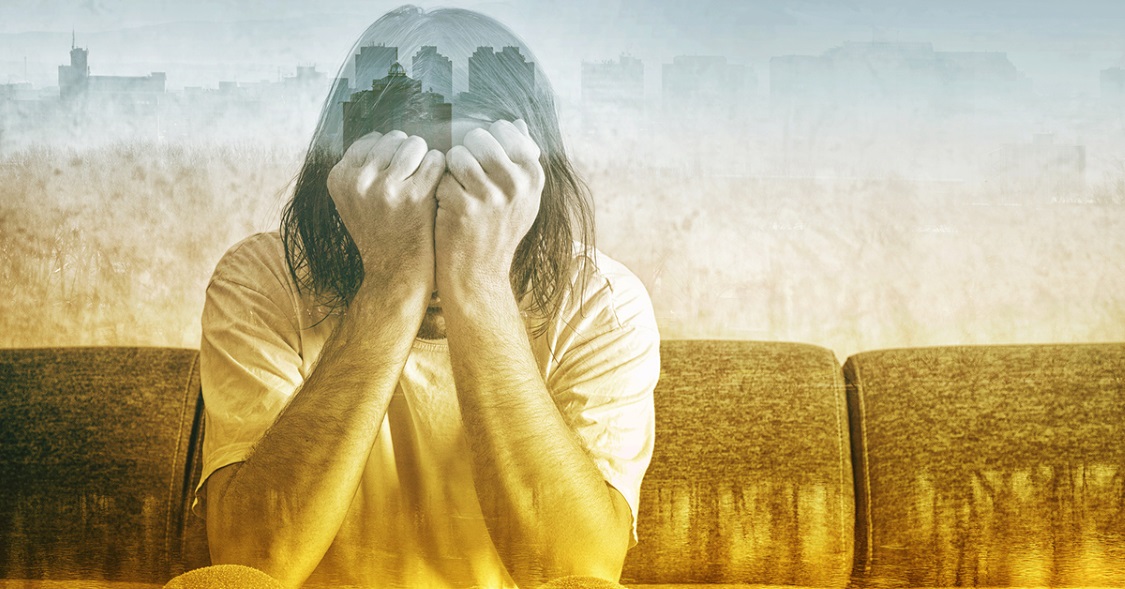
Many are familiar with the celebrated “boiled frog” fable (real frogs are smarter than this) in which the amphibian is placed in a beaker of water that is gradually heated until the animal is boiled alive. Even though it could easily leap to freedom, the progressive hostility of its environment is so gradual that it never quite notices. Hieromonk Gabriel helps us in this article to see just how abnormal the environment is that we inhabit, along with a brief history of how this came to pass, noting such ills as the decline of the family and the disintegration of social bonds, along with the rise of secularism and the privatization of religion.

Source: Remembering Sion
By Hieromonk Gabriel
In the most recent article of my series on the anthropology of Antichristianity, I discussed loneliness as the defining characteristic of the modern age, stating that: “We have become existentially unmoored, and so it is no surprise at all that we feel lost, purposeless, and alone.” Faced with such a dilemma, as I see it modern man has only three real choices: Christianity, Antichristianity, or suicide (the latter of which comes in any number of forms). But before examining these choices, I want to give a rather broad and cursory overview of the history of modernity, of the way in which we have come to find ourselves thus “existentially unmoored.”
The twentieth century witnessed the large-scale disintegration of almost every significant social bond which had previously held mankind together. Two horrific world wars — followed swiftly by new realities ushered in by the forces of economic and cultural globalization — nearly demolished the nationalism which had burgeoned during the nineteenth century (it very much remains to be seen whether the recent resurgence of populist sentiment in many Western nations will last for any meaningful period of time).
But nineteenth-century nationalism was itself, in many ways, merely a symptom of the loss of the Christian identity which had previously defined the West for over a thousand years. The collapse of Christendom, effected principally by the Reformation (but finding its true cause much earlier in the history of Western Christianity), is the defining event of the past millennium, and the true progenitor of the modern age.
Once Christendom in the West has been shattered by the Reformation, for a time the chief identity of a society (or of a family within that society) became either Protestant or Catholic — but the catastrophic religious wars of the sixteenth and seventeenth centuries led to the widespread adoption of state secularism (whether de facto or de jure). Religion was not suppressed, but rather privatized — indeed, there is no more fitting adjective with which to describe the character of religion in modernity than “private.” And naturally, that which is a purely private affair cannot possibly form the basis of a social or cultural identity. And though of course religion has endured up until the present day, it has by now become so “private” as to be almost totally inconsequential, even to many of those who still profess to believe. It has been compartmentalized into oblivion.
The loss of a primarily religious identity led to its replacement by the aforementioned nationalism of the nineteenth century. But before long nationalism too was in turn laid waste, once it became evident that men are just as capable of massacring one another in the name of a flag as in the name of God — indeed, when push comes to shove, a flag is possessed of markedly fewer principles than even the most savage of deities. Seán O’Casey’s famous saying that “Politics has slain its thousands, but religion has slain its ten thousands” can only be quoted with a straight face by those who realize that the political movements of modernity can only be properly understood as religious phenomena.
And so, in the wake of the Holocaust and the two most bloody wars in the history of the world, nationalism as a tenable unifying identity was on quite shaky ground. The globalism which grew to define the post-war period was more than enough to finish it off.
But that same globalism has done far more than merely end the era of nationalist identity — it has also completely decimated local communities all across the industrialized world. Only a few short centuries ago, most people were born, grew up, lived, and died in the same place, with the same people. Now, rural towns and villages around the world are being abandoned in droves, and even in urbanized areas it is growing increasingly uncommon to even know one’s next-door neighbors in the slightest — after all, what is the point of investing in such a relationship, when chances are that one or both of you will just move somewhere else before too long? (If you are interested in a catching a glimpse of the small-town America that I fear is now all but dead, pick up the Port William stories by the great writer — and true philosopher — Wendell Berry.)
But that which has always been the greatest and most fundamental source of human identity and community has, in the past century, perhaps fared worse than any of those already mentioned: we are now witnessing the absolutely catastrophic and totally unprecedented collapse of the family.
Mary Eberstadt describes some of the relevant social phenomena in her penetrating work How The West Really Lost God, which argues that more than anything else, it is the collapse of the family that has gone hand in hand with the loss of faith:
Divorce, single parenthood, widespread use of contraception, legal abortion, the sharp drop in the Western birthrate: these are just some of the prodigious transformations in family structure on which experts train their sights. And while scholars as well as nonscholars take sides on the question of whether these are good things or bad things for society, no one seriously suggests that radical family change hasn’t happened across the Western world. Obviously, it has…
To summarize our brief tour so far: families in the advanced nations today are smaller than before; they are more scattered; they are less likely to be bound by marriage; they are more likely to be “blended” in one way or another; and they are more likely to include parents and children who are regularly out of the home for substantial periods of time. Few families today are extended under the same roof; from day care to rehab centers to hospitals to nursing homes, invented institutions supply needs that were formerly met by the home.
As shattering as this already sounds, Eberstadt points out that the loss we have suffered runs even deeper than it might appear on the surface:
Underlying that loss of familial power is not only demographic reality but also the fundamental issue of identity—i.e., the fact that what were once considered by most people to be fixed and immutable ties are now frequently in flux. Once upon a time, for example, whoever married your sister became your brother-in-law for life. Today, he remains your brother-in-law only so long as he and/or your sister decide to stay together—and if they divorce, many other brothers-in-law or significant-other brother-in-law-like people might theoretically take his place. At some point in the not-so-distant Western past—to put the matter conversely, from his point of view—whoever that person was had no option but to remain your brother-in-law once he married your sister (just as he would simultaneously remain your sister’s husband, and your father’s son-in-law, and your daughter’s uncle, and so on, for life). Today, of course, every one of those identities that were once considered permanent can change according to his intentions or his wife’s.
This is just one example of how the collision between the family and the modern world has resulted in a radical redefinition of the family. One can easily think of others. In the movie The Godfather II, protagonist Michael Corleone’s mother consoles him in a moment of marital trouble, telling him firmly that it is impossible to lose your family. Such was true in her native, traditional-minded Sicily, perhaps; but as Michael knows, and Mamma does not, such is not the case in the modern West. Precisely because the family can now be redefined according to what its members decide to do—particularly its most powerful members—it is possible indeed to “lose” one’s family as it never was before. Biological ties, and only biological ties, remain immutable.
Hence kinship, to repeat, does not define modern men and women as it once did our ancestors; for many people, “family” is instead, at least in part, a series of optional associations that can be and sometimes are discarded voluntarily depending on preference. To put it lightly, when measured against the sweep of human history, this is rather a new and potent sociological fact.
I can think of no starker or more poignant example of this phenomenon than the beautiful (but painful) memoir Hillbilly Elegy by J.D. Vance. It is well worth reading — but for the sake of what it actually is, rather than what many have made it out to be: it is a memoir, not a political tract. (I will also caution that it is an honest portrayal of extremely broken people, and some of the language quoted is quite crude.)
But to return to Eberstadt, here we see the fundamental nature of the family in modern times laid bare: it is “a series of optional associations that can be and sometimes are discarded voluntarily depending on preference.” In other words: the one institution that once universally demanded permanent, unchanging love and unconditional self-sacrifice has now become nothing more than yet another consumer commodity.
In the modern age, we worship ourselves — and without any doubt, we too are jealous gods. It is ultimately our own self-love that has destroyed us, and that cannot help but destroy even that which it holds most dear. We have placed everything in the world upon the altar of our own will and our own desire — and in the holocaust of such a sacrifice, there is absolutely nothing which can endure.

About the Author

- Hieromonk Gabriel is an Orthodox priest-monk living in the Hermitage of the Holy Cross Monastery in West Virginia. He blogs at Remembering Sion.
- November 21, 2019ArticlesHow Not to Perish Eternally
- August 24, 2019ArticlesShould St. Paul Have Been More Tolerant? What Modern Churches Are Missing
- October 28, 2018ArticlesWhy We Are So Lonely
- August 18, 2018ArticlesYe Shall Be As Gods: The Nature of Lawlessness